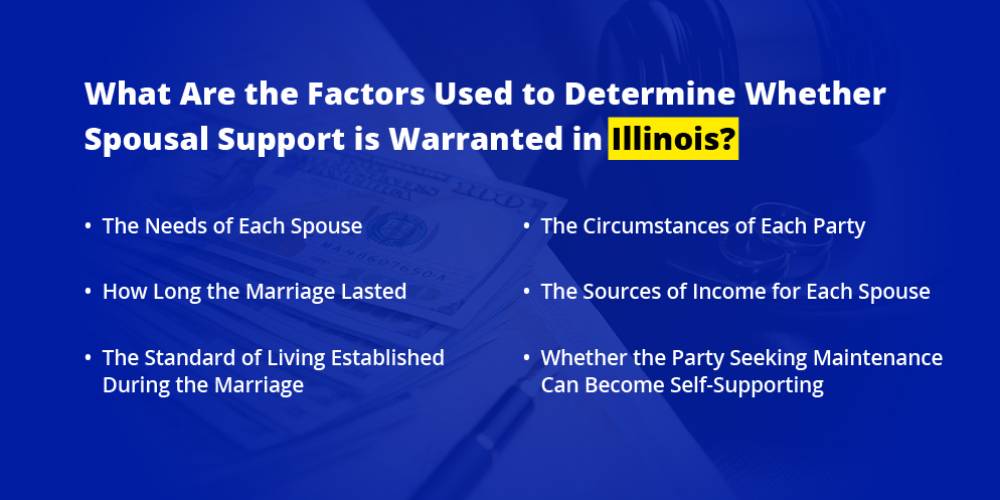A History and Explanation of Alimony
 The issue of alimony during a divorce can be highly contested between separating spouses, especially when one party’s economic means are greater than the other party's. One reason for the conflict caused by alimony is a lack of a true understanding of its definition in Illinois, as well as its historical context in both broad and narrow contexts.
The issue of alimony during a divorce can be highly contested between separating spouses, especially when one party’s economic means are greater than the other party's. One reason for the conflict caused by alimony is a lack of a true understanding of its definition in Illinois, as well as its historical context in both broad and narrow contexts.
It is a common misconception that alimony is a relatively new concept, largely attributed to the increase in the divorce rate observed over the last 30 years. However, the idea dates back hundreds of years. The origins of alimony stem from the divorce principles derived from English laws of coverture. Coverture established a married couple as a single legal entity, thereby merging their identities for legal purposes.
This gave the husband control over all assets. In return, the husband was legally and morally obliged to "support and protect" his wife. This English tradition carried over to the United States. There are records indicating court-ordered alimony in the colonies, with the justification being that women had no other means of supporting themselves without their husbands' financial support. Consulting with a knowledgeable Batavia, IL family law attorney can be highly beneficial.
Changes in Divorce Laws Took Time
Social thought progressed with time, and in the 1850s, some states enacted laws allowing divorced women to reclaim property they brought into a marriage.
From a certain perspective, these laws may eliminate the need for alimony, allowing both parties to retain their individual personal assets upon separation. The issue is not that clear-cut, however, and there are a few major points to consider. These include:
- Traditionally, men have been the primary source of income in the household; however, this is not necessarily true today.
- By definition, under the traditional common law, removing alimony payments upon divorce would mean releasing the husband from his duty to "support and protect."
- Completely dissolving economic ties between divorcing spouses can leave one economically destitute.
Therefore, the contemporary idea of alimony has evolved into the question of where the potential economic burden should fall while also creating the conflict so commonly seen in these cases. Spousal support in Illinois addresses these points and more, with laws ensuring that one party is not left in dire financial straits solely because of divorce.
What Are the Factors Used to Determine Whether Spousal Support is Warranted in Illinois?
The factors a judge considers during a divorce to determine whether spousal support is appropriate are extensive. While a judge can deviate from the factors and the formula used to determine the amount, it is rare for one to do so.
If a judge deviates substantially from what the guideline spousal support would have been, he or she must state what it would have been and why that amount was considered inappropriate or inequitable. The factors that determine whether spousal support will be awarded are detailed in Section 504 of the Illinois Marriage and Dissolution of Marriage Act (750 ILCS 5/504) include:
Whether the Party Seeking Maintenance Can Become Self-Supporting
The court will consider whether there are minor children that the party seeking maintenance will be largely responsible for, and how this will affect employment opportunities. If the marriage is long-term, and the party seeking support gave up employment opportunities to further the other’s career, the court will consider how long it will take for that spouse to acquire education, training, and employment.
What Level of Income and Assets Each Spouse Will Have After the Divorce
The court will consider the marital and non-marital assets of each spouse, along with the associated expenses. In some cases, the spouse seeking alimony may have received considerably more marital assets than the other spouse, which could factor into the determination of spousal support.

The Circumstances of Each Party
The court will consider the age, health, occupation, sources of income, vocational skills, employability, and the division of marital assets and liabilities when determining whether spousal support is appropriate. While on the surface, the court is deciding whether one spouse will be awarded alimony, it is also deciding whether the other spouse has the ability to pay alimony.
The Sources of Income for Each Spouse
The court will consider each spouse’s income from employment but may also examine income from disability payments, private retirement funds, or Social Security. The money can be private income or public income. The realistic present and future earning capacity of each spouse is also taken into consideration. If there is a significant disparity in the earning capacity of the spouses, this could be a factor in the award of spousal support.
The Needs of Each Spouse
The court will consider the needs of the spouse requesting spousal support, as well as the other spouse’s ability to meet those needs financially. Does the paying spouse have the ability to supplement the difference between the other spouse’s needs and that spouse’s ability to meet those needs?
Is the Impairment of Earning Capacity for the Spouse Seeking Alimony the Other’s "Fault?"
Perhaps both spouses were in college when they met, and both had career goals. One spouse may have been working to become a neurosurgeon, causing the other to drop out of college and financially support them. At some point, children arrived, the home needed attention, and the spouse never completed his or her education. In a similar situation, it could make sense for the court to award spousal support to the spouse who gave up career and employment opportunities.
The Standard of Living Established During the Marriage
The standard of living established by the spouses during the marriage may be a significant factor in determining whether spousal support is warranted. Marriages of long duration often see this factor come into play. This does not mean that the spouse seeking support will be able to maintain exactly the same standard of living as the couple had during the marriage.
How Long the Marriage Lasted
This is a major factor in the award of spousal support. The longer the marriage, the longer the spousal support will usually last, especially if the marriage lasts longer than 20 years. That said, if one spouse is in failing health, the court may overlook the fact that the marriage did not last more than a decade or so and award spousal support for a longer period.
Whether a Prenuptial or Postnuptial Agreement Exists
If there is a prenuptial or postnuptial agreement that specifically addresses spousal support, the court may have little say in the matter. However, such an agreement can be voided if the court finds it is clearly unfair to one party or one party signed under coercion or duress.
Other Factors to Consider
Any other relevant factors will be considered when determining whether spousal support is appropriate. This does not mean that each factor carries the same weight, and the court will make those determinations.
Contact a Kane County, IL Spousal Support Lawyer
If you are in the Chicago, Illinois area and need the professional, legal assistance of an Aurora, IL spousal support attorney for your personal alimony case, The Law Office of Matthew M. Williams, P.C. can guide you through each step of the process with care. Contact us today with any and all of your divorce, alimony, or other family law inquiries and set up a free consultation.
Attorney Williams has extensive experience in all family law issues and will work hard to ensure your spousal support issue is resolved equitably. Attorney Williams focuses on mediation and collaborative divorce to reduce the costs associated with divorce, making the process easier and more amicable. Call 630-409-8184 to schedule your initial attorney meeting to discuss your family law issue.

 630-409-8184
630-409-8184













